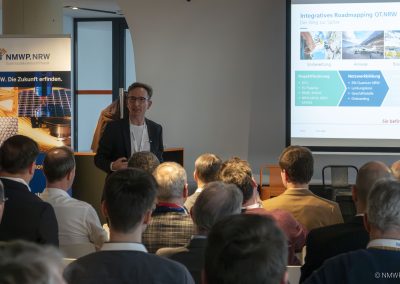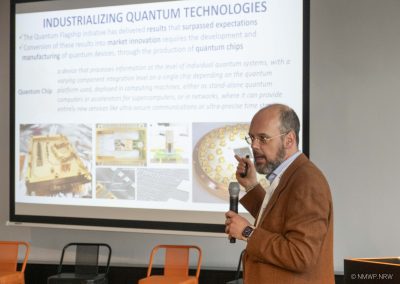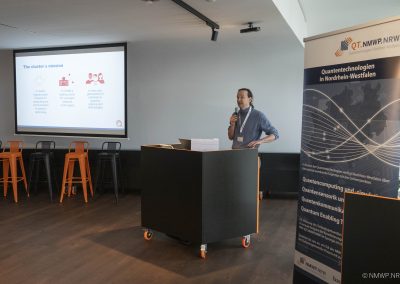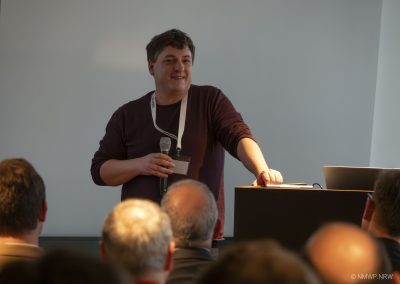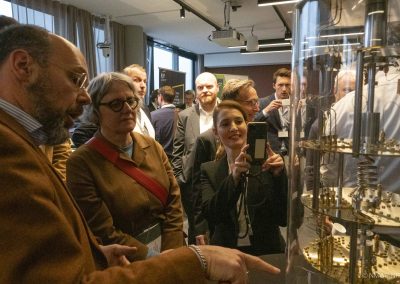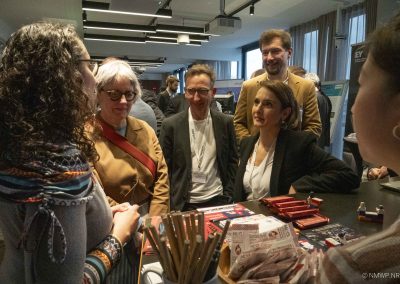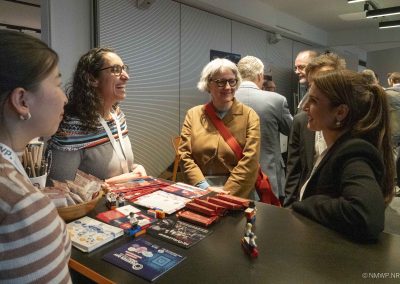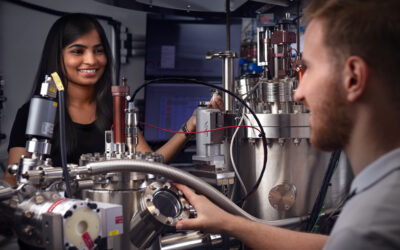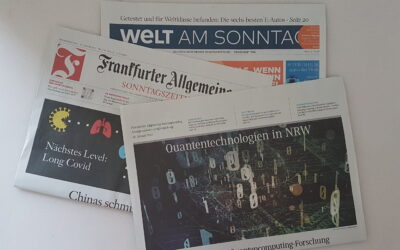North Rhine-Westphalia’s quantum technology community gathers to launch the roadmapping process
Quantum technologies can help address the significant challenges of our time. Universities, research institutions, startups, and companies in North Rhine-Westphalia are already excellently positioned in this important future field. To leverage these strengths and unlock the outstanding potential, a roadmap for quantum technologies is now being developed. At the initiative of the state, stakeholders from science and industry are coming together to create a plan for the future of quantum technology in North Rhine-Westphalia throughout the year. On Tuesday, January 30, 2024, the kickoff event for the roadmapping process took place in Cologne, bringing together numerous researchers—including many ML4Q members—as well as representatives from startups and larger companies.
North Rhine-Westphalia, with its unique research and scientific landscape, has the best conditions to tackle the major challenges of the future. Quantum technologies will play a key role in this. With the roadmap, we are bringing together leading players from science and industry to quickly and successfully apply innovations from quantum technologies for the benefit of society.
Quantum technology offers enormous opportunities for digital and efficient processes, and thus also for the transformation towards resource efficiency. In North Rhine-Westphalia, we are leading the way and supporting our companies with our roadmap to effectively harness the diverse potential of this future technology and strengthen their competitiveness with forward-looking innovations. The successful kick-off event in Cologne impressively demonstrates how business and science are expanding their expertise in quantum technology through close collaboration and provides important impetus for further technological development in our state.
North Rhine-Westphalia is a very vibrant quantum ecosystem. The roadmapping offers the opportunity and platform to interlink the various activities in the state. Now, after the official kick-off meeting, things can really get started. We envision an inclusive process. Anyone who wants to contribute expertise and ideas is welcome; so far, 70 companies, universities, and research institutes have joined. The goal is to develop a shared understanding of the opportunities and challenges, and to identify ways to synergistically pool resources in NRW and fully harness the potential.
Quantum technologies will transform our daily lives. Their foundations lie in the principles of quantum mechanics, which describe the behavior of particles at the atomic and subatomic levels. Quantum effects have long been in use and form the basis for technologies like lasers, MRI, broadband internet, and satellite navigation. However, some properties are only now becoming technologically feasible, offering potential for entirely new solutions. Examples of these opportunities include vastly enhanced data security, highly precise measuring devices, and the impressive computing power of quantum computers.
North Rhine-Westphalia has developed into one of the leading centers for quantum research, thanks to its uniquely high density of universities and research institutions. All technological research approaches that are particularly significant for quantum computing are being pursued in North Rhine-Westphalia: superconducting circuits (Forschungszentrum Jülich), ion traps (University of Siegen), photons (University of Paderborn), and semiconductor-based approaches (Cluster of Excellence “Matter and Light for Quantum Computing,” lead university: University of Cologne).
In addition, science and industry in North Rhine-Westphalia have access to unique infrastructures: at Forschungszentrum Jülich, Europe’s most powerful supercomputer, JUPITER, will be put into operation at the exascale level in 2024. It will be able to connect with the quantum computers already there—for example, to demonstrate the value-added potential for North Rhine-Westphalia’s large companies. At the Fraunhofer Institute for Laser Technology in Aachen, Germany’s only node for the quantum internet is located. Furthermore, startups and established companies from North Rhine-Westphalia are leading the way in developing hardware and software solutions for quantum computing.
Background:
The Ministry of Culture and Science (MKW) and the Ministry of Economic Affairs, Industry, Climate Action, and Energy (MWIKE) are enabling the joint roadmapping process. The process is being carried out on behalf of the ministries by the Fraunhofer Institute for Laser Technology (ILT) in Aachen, Forschungszentrum Jülich, and the coordination office QT.NMPW.NRW, with the participation of all interested stakeholders. The NRW Quantum Technologies Roadmap lays the groundwork for research and science to work together with companies to identify application areas for quantum technology and develop applications that can be commercially exploited.
More ML4Q transfer activities
EIN Quantum NRW – North Rhine-Westphalia joins forces to establish a hub for quantum science and technologies
EIN Quantum NRW North Rhine-Westphalia joins forces to establish a hub for quantum science and technologies Education, Innovation, Networking in quantum science and technology - these are the goals of the new quantum computing network "EIN Quantum NRW", which bundles...
Quantum technologies in NRW – scientists present a rich research landscape
Quantum research in North Rhine-Westphalia is taking different paths to develop the most powerful freely programmable quantum computers. Numerous universities and research institutes are involved. Scientists from North Rhine-Westphalian universities in Aachen, Bochum,...
ProvideQ – David Gross joins a new consortium funded by BMWK
ML4Q member and Cologne site representative, Professor David Gross, successfully acquired BMWK funds within the ProvideQ project consortium. ProvideQ is one of six winning projects of the funding call "Quantum Computing - Applications for Industry" with which the...
